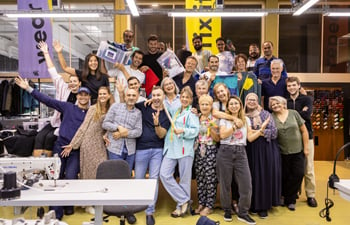Since the disaster at the Rana Plaza factory in 2013, which killed 1,134 people, there has rightly been a lot of concern around the need for fair wages and safe working conditions in the textile industry. But that’s not the only issue: the industry is one of the most polluting in the world, responsible for 10% of global CO2 emissions and a growing mountain of waste. If nothing is done, the amount of waste will continue to grow, and CO2 emissions will account for 26% of the world total by 2050. An invisible, silent tragedy is unfolding.
Throughout the supply chain, innovative initiatives are cropping up that aim to make the industry more circular. DOEN supports many of these pioneers, and this magazine* features some of them.
For an expanding group of millennials, buying second-hand clothing is a matter of course. Yet judging by the queues at Primark and Zara, many consumers appear more interested in getting a hefty dose of retail therapy after being cooped up inside for weeks. The massively underpriced shirts don’t factor in the huge amount of environmental pollution generated by their manufacture. We can call on people to consume less, but perhaps we’re placing too much responsibility on consumers. Is it really only a question of demand, or is supply a big part of the problem?
If we hope to move towards a more sustainable textile industry, towards real systemic change, it’s simply not enough to encourage innovations like the shining examples in this magazine or to call on people to consume less or make the right choices. We also have to dismantle existing systems – in this case, fast fashion. And government, companies and investors have a role to play.
Greenwashing by the big clothing companies is the order of the day. Claims of circular T-shirts and sustainable cotton lull consumers into complacency. Meanwhile, there’s another big problem: massive overproduction. Clothing brands place orders with six factories and only purchase from three. Collections go out of fashion and straight to the rubbish heap. And return shipments are often destroyed.
[The Dutch political party] D66 recently tabled a motion calling for a European hallmark for sustainable clothing to combat greenwashing. And the Netherlands Authority for Consumers and Markets’ recent announcement of its intention to tackle the problem is certainly encouraging. There’s no doubt that there’s still a lot to do. But helping consumers who want to shop sustainably but can’t see the wood for the trees is a step in the right direction.
Legislation can also combat overproduction. For example, companies could be compelled to be transparent about where their products come from and how they are produced. Limits could be placed on the volume of virgin material used. And it could be made compulsory for everything to come from organic sources.
Investors have a responsibility here too. Pension funds and other shareholders continue to push up clothing makers’ margins in order to maximise profits. In a drive to improve working conditions, Platform Living Wage Financials has been established in the Netherlands. It is essentially an alliance of investors that structurally encourages and monitors the payment of a living wage by investees. A similar platform could be set up to address the industry’s negative environmental impact.
Ultimately, we must move towards a system that is both fairer and more sustainable.
There is no magic bullet for systemic change. DOEN will continue to support enthusiastic pioneers. Systemic change involves innovative niche projects like theirs, but also the dismantling of existing systems. Government, business, shareholders all have a role to play. So be courageous, let the demolition begin, and stop fast fashion.
*This column was published in P+ magazine. The DOEN Foundation and P+ are co-producing a short series of special reports to show what’s happening today in the field of circular fashion.
Also check out the Circulair Fashion Lookbook (Circular Fashion Lookbook) for photos of work by trendsetting clothing makers supported by DOEN.


